Covid grants a start but more help needed, say firms
- Published
- comments
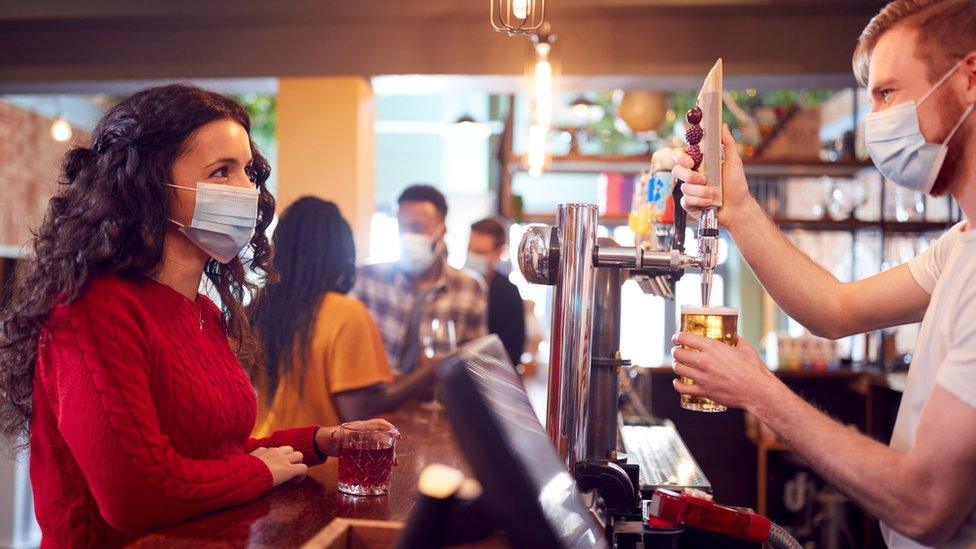
Pubs, restaurants and theatres have cautiously welcomed new government grants to help them deal with a collapse in consumer confidence caused by Omicron.
But others, including beauty salons and nightclubs, said the package was merely scratching the surface.
Hospitality and leisure firms can apply for grants of up to £6,000 per premises as they face a sharp drop in bookings.
There's also £30m more for the arts and £100m for councils to help small firms.
But the Federation of Small Businesses warned that the success of the package would be "measured by how quickly this new, urgently needed support reaches those in need".
'Vital lifeline for pubs'
Eating and drinking out are two activities that have been hit by the latest variant of Covid.
Although pubs and restaurants remain open and have not been subject to new restrictions, many people have been reluctant to visit them for fear of catching the virus.
The British Beer & Pub Association's chief executive, Emma McClarkin, said: "This short-term package of support from the chancellor is welcome at this extremely challenging time for pubs and brewers.
"It will be a vital lifeline for many and will help compensate businesses for the dramatically reduced trade already being experienced in the run-up to Christmas."
However, James Calder, chief executive of the Society of Independent Brewers, said the £6,000 announced for each pub "isn't really going to touch the sides".
The response was two cheers at best from independent Liverpool bar operator Ma Pub Group.
"Without furlough for now, the plan is to let us stay open, but the reality remains that trade has dropped hugely at the busiest time of the year," said boss Iain Hoskins.
"The point is that it costs me more to stay open than when we are closed and while I don't think anyone is expecting to have all lost Christmas sales reimbursed by the government, the £6,000 grant is a drop in the ocean at this time of year."
Fulham Shore, the firm that runs the Franco Manca and Real Greek Restaurant chains, said £6,000 would cover just a week's worth of wages at one of its restaurants.
Gyms not included
While the support package is aimed at leisure businesses, gyms will not be eligible for the targetted grants, the Treasury confirmed. They can, however, apply for discretionary loans from local councils.
The Chartered Institute for the Management of Sport and Physical Activity said it was "dismayed".
"Gyms, fitness and leisure centres have already felt the impact of reduced footfall in December and are now facing an extremely uncertain New Year," said boss Tara Dillon.
"In the middle of a national health crisis, and in the midst of winter, it is frankly staggering that the government does not recognise the value of a sector that helps to keep the nation physically and mentally fit, and employs hundreds of thousands of people."
Hotel giant underwhelmed
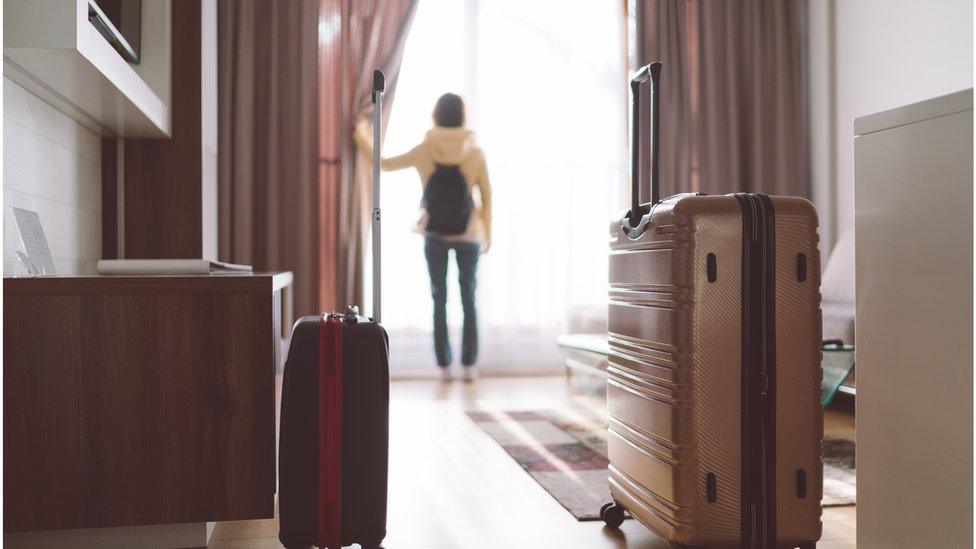
Best Western GB, which runs 300 UK hotels, said the chancellor's support was like a "dud cracker on Christmas Day".
"It's just so disappointing and underwhelming in every sense," said the chain's chief executive, Tim Rumney.
He said the grants would not go far enough to cover the costs of three weeks of cancellations, with some hotels having seen 50% fewer bookings compared with pre-pandemic levels.
"It's too little, too late," he said.
Mr Rumney said the VAT rate, which now stands at 12.5% for hospitality, should return to 5% and that the furlough scheme should be revived if Omicron worsens.
'Beauty sector needs more'
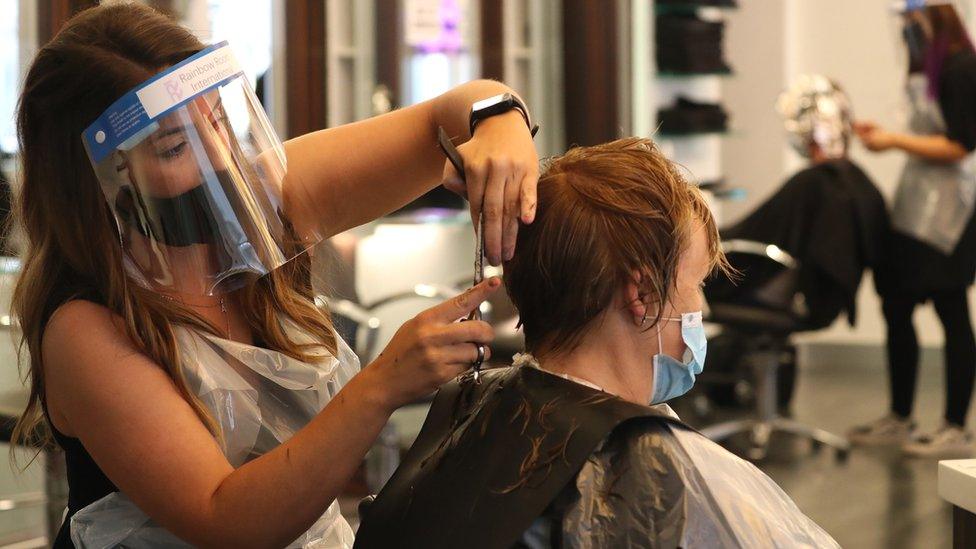
Hair and beauty salons face particular problems, since it is not possible to observe social distancing when undergoing most of the treatments involved.
However, the sector has received no targeted help as part of the latest measures, although businesses can still apply for an Additional Restrictions Grant, distributed by local councils to businesses outside leisure and hospitality at their own discretion.
"Our latest NHBF snap poll, from last week, demonstrates that over 70% of salons are experiencing unprecedented cancellations which will have a huge impact on their turnover," said Richard Lambert, chief executive of the National Hair & Beauty Federation.
"In the past, the government has called our industry 'essential' to UK GDP and well-being, so it's unfathomable that they are not giving any financial support to help save previously highly profitable salon businesses and those they employ."
Lesley Blair, head of the British Association of Beauty Therapy & Cosmetology, was also disappointed.
"Our personal care sector has been one of the worst hit throughout this pandemic," she said. "We urgently require government to provide our sector more support."
'High Street left damaged'
High Street shops have also been hit as consumers go out less, but again, no targeted support was offered.
Andrew Goodacre, head of the British Independent Retailers Association (Bira), said: "Shops do not have cancelled bookings to shout about. However they do have lower footfall, cancelled trips to the shops and therefore cancelled purchases at a critical time of year - just as much damage but just not as 'visible.'"
'Nightclubs disappointed, but theatres grateful'
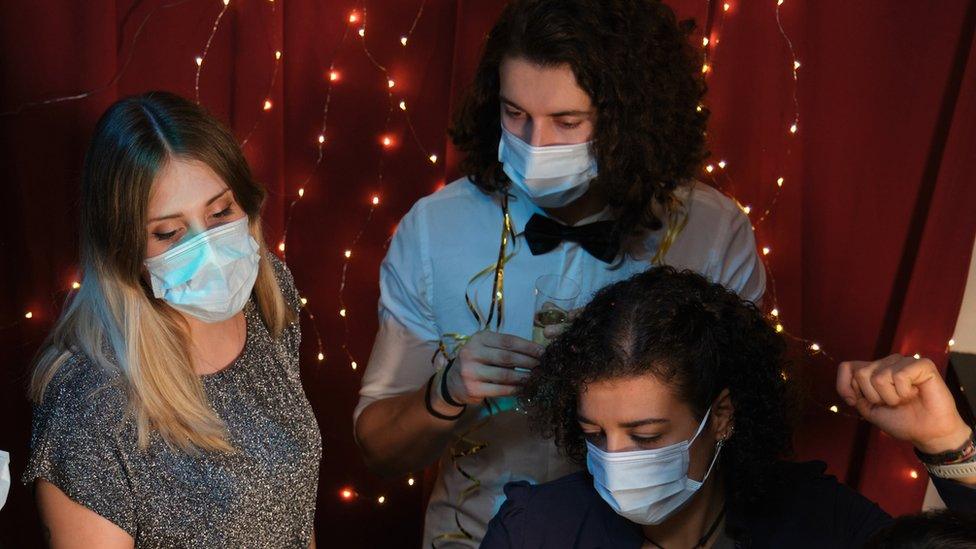
The night-time economy is also badly served by the package, says nightclub operator Rekom, which has more than 40 venues across the UK.
Peter Marks, chairman of its UK board, said the government had not done "anywhere near" enough.
"Given the fact that we would have made around £60,000 per premises per December, this covers just 10% per venue, so barely scratches the surface," he told the BBC.
Mr Marks warned that the £6,000 would not take into account the size of the businesses, meaning larger operators would be disadvantaged.
Michael Kill, the chief executive of the Night Time Industries Association, said the measures "border on the insulting".
Theatres and museums saw themselves as more fortunate.
Stephanie Sirr, chief executive of the Nottingham Playhouse and president of UK Theatre, told the BBC she felt the Treasury had "clearly listened" and was "very grateful".
However, as this period is when theatres make most of their money, she explained that theatres were still set for an extremely tough Christmas.
'Travel neglected'
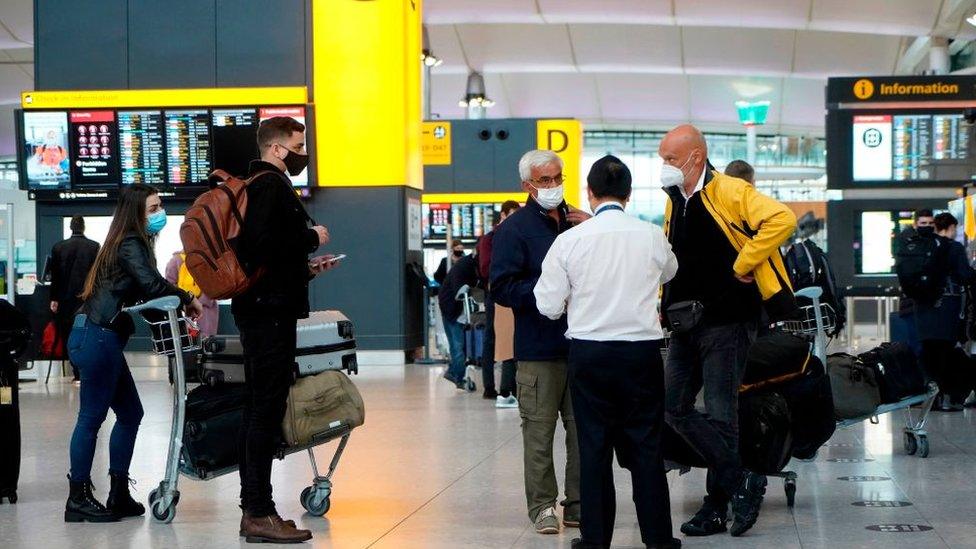
Travel industry trade body Abta said the chancellor's statement "once again ignores the direct impact" on businesses reliant on international travel.
"Travel agents, tour operators and travel management companies will rightly be asking why they haven't been given the same treatment as other businesses that are suffering at this time," Luke Petherbridge, Abta's director of public affairs, told the BBC.
The head of trade body Airlines UK, Tim Alderslade, also said the travel industry would need similar support if the government's travel restrictions review on 5 January did not announce more help.
"We've done everything possible to preserve cash, as the chancellor asked us to. He now needs to either open up travel or provide the same support as offered to other sectors."
Related topics
- Published20 December 2021

- Published20 December 2021

- Published6 December 2021